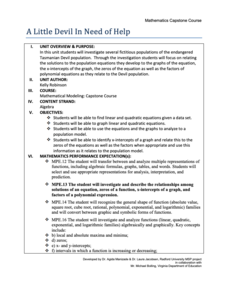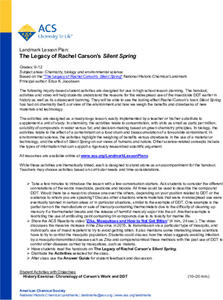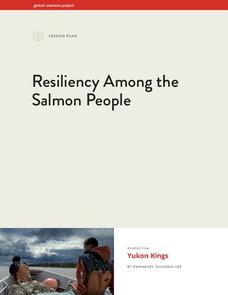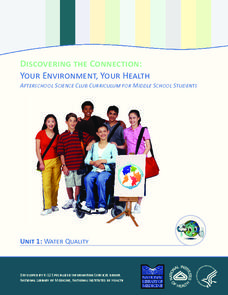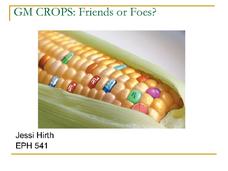Environmental Protection Agency (EPA)
Teachers' Guide to Using A Day In the Life of a Drop
Hydrology hopefuls learn about their local watershed. Through discussion and online interactives, they see that their habits affect the water supply. The instructional activity concludes with a pledge to filter out bad water usage...
Howard Hughes Medical Institute
Human Skin Color: Evidence for Selection
Skin color is controlled by at least six genes. Young scientists learn about skin colors through a documentary. They discuss the topics of pigment, natural selection, and vitamin D absorption. They apply their knowledge to higher order...
NASA
Cleaning Water
Give young scientists a new appreciation of fresh, clean drinking water. After learning about the ways astronauts recycle their air and water, your class will work in small groups creating and testing their very own water filtration...
Poetry Class
Tackling Climate Change
Get your kids thinking about climate change with a series of activities that include creating a ditty box poem for the planet, a poem that identifies concepts or objects they would want to preserve.
SRI International
Science of Water
Water is crucial to survival. Scholars gain an appreciation for water by reading about it, learning about its atomic properties, and investigating its properties through six stations in a lab activity.
National Park Service
Maltese Cross Cabin
The Maltese Cross Cabin, a frontier residence of Theodore Roosevelt, is a time capsule that commemorates Roosevelt's time in the Dakota territory. An explanatory video and response guide takes learners on a virtual tour of the wooden...
Radford University
Mathematical Modeling: Lesson 1
Will more deer result in more big game licenses? Scholars first research data on the number of deer and the number of big game licenses in Virginia between 1990 to 2009. They apply polynomial, exponential, and logarithmic regression to...
Radford University
A Little Devil In Need of Help
Math modeling to help endangered species? Scholars first investigate linear and exponential equations and graphs that model fictitious animal populations. They consider how key features of the graphs relate to the situation. As a final...
NASA
Wetlands
Take a little wade in the wetlands. A fun unit has pupils conduct a literature review to learn how climate change and human actions affect wetland ecosystems. They take a trip to a wetland, observe the fauna and flora, and then take and...
American Chemical Society
The Legacy of Rachel Carson’s Silent Spring
How do we protect crops and protect the environment at the same time? Using reading materials, learners explore the history of the use of pesticides and biocides. They create a timeline and then explore the current practices.
EngageNY
Tracing a Speaker’s Argument: John Stossel DDT Video
Which side are you on? Scholars watch a video of John Stossel discussing the use of DDT pesticide. Learners talk about the purpose of the video and the speaker's argument and then complete a Tracing an Argument graphic organizer while...
Bonneville
The Problem of Plastic Trash Islands
Trash collection can be a hassle, especially out in the ocean. The second of four parts in the Adrift in a Sea of Plastic unit has pupils research plastic trash islands in marine ecosystems. They investigate why they occur and potential...
National Library of Medicine
Your Environment, Your Health: Runoff, Impervious Surfaces, and Smart Development
Can a sidewalk increase the amount of pollution in local streams? Scholars learn the answer to this question though research and experimentation in the fifth unit in the six-part series. Pupils study runoff, impervious surfaces, and the...
National Library of Medicine
Your Environment, Your Health: Food Safety
Did youknow that chicken causes the greatest risk of food-borne illness. The fourth unit in a six-part series addresses food safety. Scholars research common scenarios of food causing illness through the National Institute for Health....
Global Oneness Project
Reclaiming Rivers
Robert Hass's article "Rivers and Stories" underscores the importance of rivers in the development of civilization and the importance of reclaiming supposedly dead rivers and implementing policies that protect river health. Groups...
Global Oneness Project
Resiliency Among the Salmon People
Is losing cultural traditions the cost of social progress, or should people make stronger efforts to preserve these traditions? High schoolers watch a short film about the native Yup'ik people in Alaska and how they handle the shifts in...
Personal Genetics Education Project
Genetics and Reproduction
Disease prevention or designer babies? Use a set of slides to introduce the growing practice of preimplantation genetic diagnosis, or PGD. Teens read related articles and then break into groups to address different scenarios. Afterward,...
Texas State Energy Conservation Office
Are Your Computers Wasting Energy?
After reading about the amount of energy that is used to power a personal computer, learners take a look at their own computer use and therefore, their energy consumption. They do this through a series of questions and computations on...
Montgomery County Public Schools
Summer Journal Ideas
Twenty prompts, fifteen starters, and ten situations. What more could you ask for from a list of journal ideas?
National Wildlife Federation
Climate Solutions – A Call to Action!
The final lesson in the 21-part series on climate change focuses on energy solutions to the consumption problem. Using data specific to their school, pupils make recommendations, follow up on actions, and carefully track progress....
National Library of Medicine
Your Environment, Your Health: Water Quality
How important is water quality where you live? The first module in a six-unit series includes four lessons on water quality. By applying the concept directly to the lives of pupils, they engage in meaningful learning. They read about...
National Library of Medicine
Your Environment, Your Health: Chemicals in Your Home
Many people know about chemical pollution, but are all chemicals bad? The third unit in a series of six addresses chemicals common in everyday life. Scholars learn about the chemicals found in their own homes, chemical safety, and...
Dream of a Nation
Writing a Narrative Essay
Imagine using narrative essays to encourage change. This multi-week unit plan does just that. After reading a series of articles from Tyson Miller's Dream of a Nation: Inspiring Ideas for a Better America, class members examine the...
Curated OER
GM Crops: Friends or Foes?
Genetically modified crops—How do you feel about them? Here, explore the benefits and risks of GM crops to inform your opinion.









